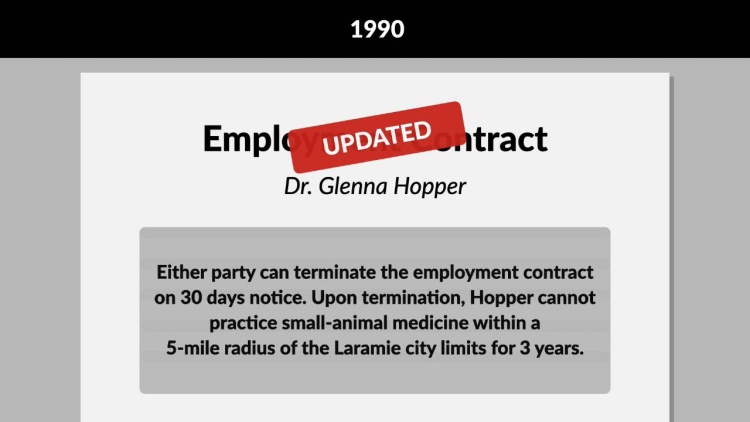Hopper v. All Pet Animal Clinic
Wyoming Supreme Court
861 P.2d 531 (1993)

- Written by Christine Hilgeman, JD
Facts
Dr. Glenna Hopper (defendant) worked for three years, following her education as a veterinarian, with her employer, All Pet Animal Clinic (All Pet) (plaintiff). During the course of that employment, Hopper executed a restrictive covenant in which she agreed that upon termination of her employment at All Pet, she would not practice small-animal veterinarian medicine for a three-year period from the date of termination within five miles of the corporate limits of Laramie, Wyoming. After it appeared to the president of All Pet that Hopper was preparing to purchase and operate another local veterinarian practice, Hopper’s employment was terminated. Hopper subsequently opened her own veterinarian practice. All Pet, together with Alpine Animal Clinic, Inc. (Alpine) (plaintiff), sought injunctive relief and damages. The trial commenced two years after Hopper had been discharged. The evidence at trial showed that over half of Hopper’s gross income was derived from her small-animal practice and that All Pet and Alpine lost 187 of their clients to Hopper’s new practice. The evidence also showed that All Pet’s and Alpine’s clients were located throughout the county. The trial court granted an injunction, but declined to award damages to All Pet and Alpine as being too speculative. All of the parties appealed to the Wyoming Supreme Court.
Rule of Law
Issue
Holding and Reasoning (Taylor, J.)
Dissent (Cardine, J.)
What to do next…
Here's why 907,000 law students have relied on our case briefs:
- Written by law professors and practitioners, not other law students. 47,100 briefs, keyed to 996 casebooks. Top-notch customer support.
- The right amount of information, includes the facts, issues, rule of law, holding and reasoning, and any concurrences and dissents.
- Access in your classes, works on your mobile and tablet. Massive library of related video lessons and high quality multiple-choice questions.
- Easy to use, uniform format for every case brief. Written in plain English, not in legalese. Our briefs summarize and simplify; they don’t just repeat the court’s language.





